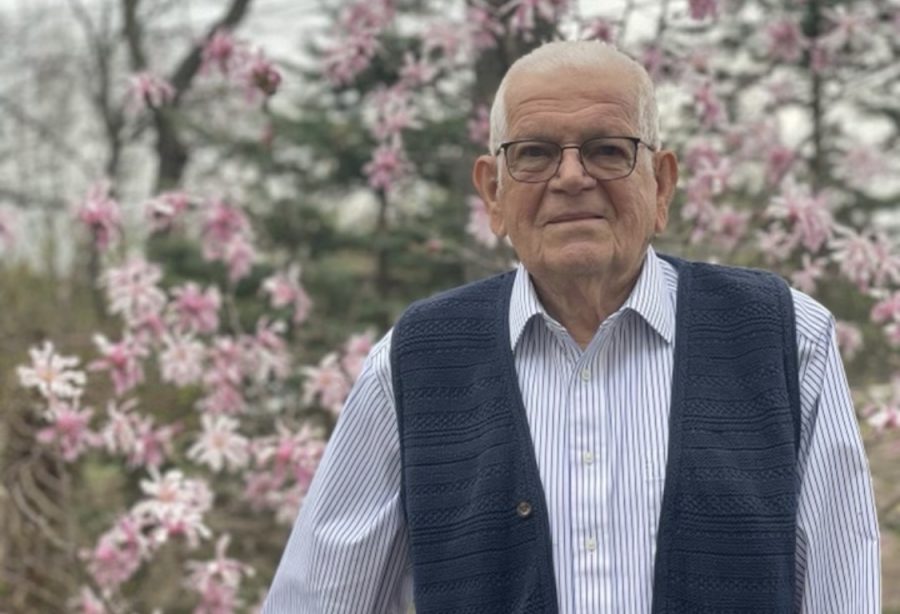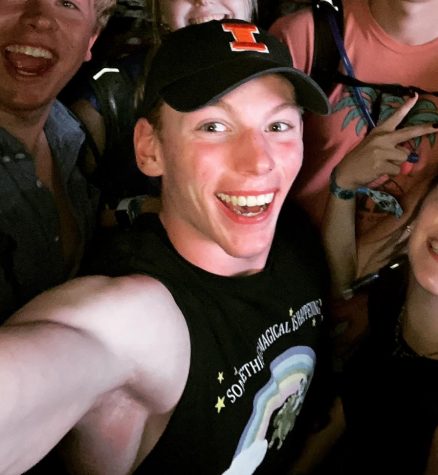A lifetime of biking
April 28, 2022
Editor’s Note: The following is an individual piece on a community member. Though our web content is generally shortened, the writer and editors felt this story deserved an full, in-depth look.
Ray Rhoads slides into the saggy booth of a Panera Bread restaurant, slowly sinking into the same seat cushion hundreds of people have sat in prior to him. One seat, yet thousands of different stories told, ranging from all ages and experiences, some good, some bad, and everything in between.
Here sits a man who has seen the world at war, the first man on the moon, and the first Jeep to come out. Rhoads has lived through and experienced history in his near century of life, yet is surprised when told how remarkable his life is. A lot of those experiences would not have come to fruition if it was not for biking.
Rhoads and his group of friends went out every Saturday morning for a ride on what used to be the countryside of Crystal Lake.
“The rides were never long,” Rhoads said. “We would stop and spend most of our time for breakfast.”
Rhoads chuckles. Now in his early 90s, he is no longer biking, no longer in the same physical shape, no longer being able to put out the volume as he once was.
Those rides are what sparked his passion; they eventually became routine, friendships bonded, and one day they asked him if he wanted to join them on that year’s RAGBRAI (Register’s Annual Great Bicycle Ride Across Iowa).
For those who are not aware, RAGBRAI is a ride across Iowa and lasts eight days. You start western coast, western side of Iowa, and you dip your bicycle in the Missouri River. You bike all the way across Iowa. There are several hundred-mile rides/extensions you can take.
Rhoads at first reluctantly said no, but after some convincing, he decided to join. Rhoads always traveled light, making sure to only really carry the essentials: a t-shirt, biker shorts, helmet, bike, his ID with some cash.
RAGBRAI differs from other events across the country, as you go through a lot of little towns, each one having dozens of food stands, and places to stay like schools and churches.
“We could get up early in the morning, and go 10 miles or so depending on where the next town was, and then we would stop and have breakfast,” Rhoads said.
This made it one of the better events to start off with. It still had its challenges though, with its long stretches and gradual hills.
“I don’t think Iowa is known for their increase in altitude, but I can for sure tell you a hill seems big when you are 50 miles deep in a ride,” Rhoads said.
Averaging 60-plus miles a day while fueling on an assortment of random food stands is certainly not easy. Most of the bikers during the event slept wherever there was space.
“We slept in churches and sometimes in schools, and sometimes just in parks. I can remember sleeping in a park on a picnic table while it rained,” Rhoads said.
Weather is another huge factor. This was the early ‘80s; no one had cell phones to check the forecast, so sometimes they had to ride through the elements.
“One of the times it rained absolutely terribly because you never know the weather beforehand,” Rhoads said. “So that always made it interesting, but regardless of the weather you just gotta keep going. That is all you gotta do, just keep pedaling.”
Rhoads ended up completing the event, riding roughly 470 miles over the course of 8 days. He subsequently did the annual event three more times. It was safe to say that he was hooked on these week-long rides.
Among one of those reoccurring times he did RAGBRAI there was a guy who had a sweatshirt on that said Ride The Rockies, so he asked him about that, and he said, “Oh yeah, that’s over the mountains in Colorado.”
That sounded quite interesting to Rhoads, so he wrote them a letter and signed up to go, but they wrote back and said they already had the ride for this year, but he could go next year.
The following year rolled around. Rhoads flew into Denver, then took another local plane down to the southwest corner, where he then stayed overnight in a college the night before the starting day.
The day the event started was the start of many firsts for Rhoads. For one, he is not doing this event with his friends he did previously in Iowa, nor has he ever biked the Rockies before. Despite that, Rhoads starts the event with an open mindset.
About midway through day one, Rhoads realizes that this is no Iowa. The plentiful towns are now scarce. No friends to talk to, just him, and his lightning blue Trek bike.
Being in his mid-50s at this point, more than 100 miles of what felt like straight elevation, the Colorado Rockies held true to their difficulty as they stole every grasp of air. Alone and depleted, Rhoads set down his bike without a care and passed out in a bed of wild strawberries.
“I was by myself, you don’t have a lot of time to think. In the Rockies you were focused on biking, when you are going uphill it just takes a lot of energy. You couldn’t think of anything else. I was just trying to get up the hill.”
Getting up the hill was a big recurring theme of this event. No longer in flat Iowa, riders are quickly humbled by having to be in a low gear with constant pedaling.
Even with all these challenges, Rhoads managed to prevail and finish his first Ride The Rockies. Lots of weekend biking helped him finish the event, as well as his wife supporting him at the finish line and in the airport coming home.
“My wife told me when she picked me up from the airport in Chicago, she said ‘where have you been?’ as my clothes were all tattered, I was unshaven, it looked like I walked out of a jungle,” Rhoads said.
The next most memorable event for Rhoads was when he and his wife went to Southern France for a biking event sponsored by the University of Wisconsin. Two weeks worth of country roads with a group traveling north from Marseille.
To prepare, Rhoads took a year’s worth of French at a nearby community college. Despite being in another country, this event was a lot more structured than other events Rhoads had been to. This time, the sponsor had arranged daily cottages for them to stay at and predetermined marked areas for the group of bikers to follow.
“The scenery was remarkable, and the food was even better,” Rhoads said.
Rhoads also mentioned that navigation was not too difficult, as he was used to foreign countries. This is partly because this was not his first time overseas, as he has spent a total of five years in Germany between being stationed there for the army as well as going to college there after.
The Rhoads spent their days riding the countryside of France, and their evenings enjoying authentic foods over many stories being told from others in the group. France was not as mentally nor physically taxing compared to Iowa or the Rockies, which is why it made it perfect for his wife to join in.
Rhoads leans back into the booth, eyes interlocked with the memories replaying in his head, as 40-year-old stories flood back into his mind. Sitting in a Panera on a Saturday morning is a man who has been active his whole life. He has learned three separate languages, and of course has biked a fair share.
Age is truly nothing more than a number. Rhoads chuckles at the admiration as if his stories hold any value, consistently denying his experiences as anything special. Rain clouds have subsequently taken over the sky, and it begins to rain as we get up to depart. I open the door for him. As he walks out, I watch the rain bounce off his coat as he steps into the parking lot. Not a single word about the rain, which I was surprised about, but then I remembered what he said about rain:
“You just gotta deal with everything. What are you going to do? You can’t get rid of the rain.”



